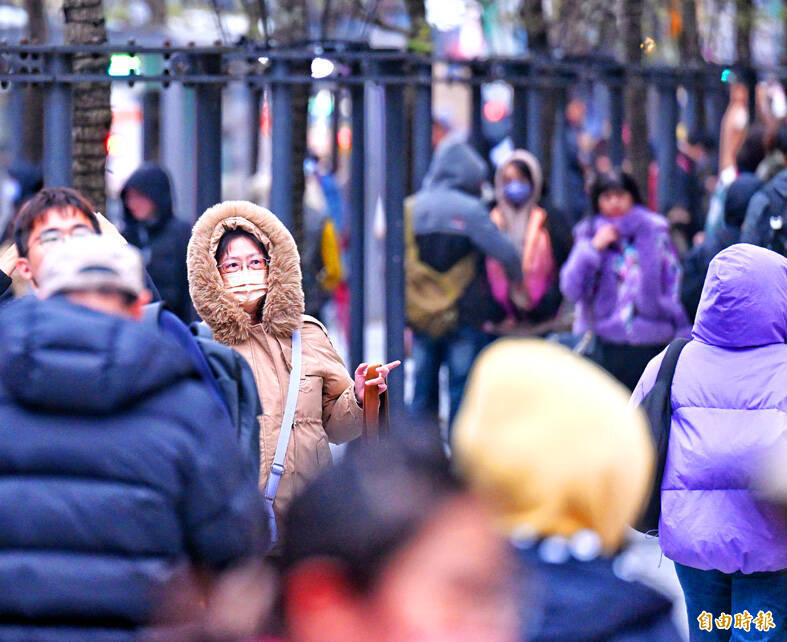《TAIPEI TIMES》 Ten ways cold weather can kill you

People in winter clothing walk on a street in Taipei yesterday. Photo: Fang Pin-chao, Taipei Times
HEALTH:Kaohsiung residents are more susceptible to heart attacks during cold weather than those in Taipei, as the warmer climate makes them more sensitive, a doctor warned
By Shen Li-hsin and Esme Yeh / Staff reporter, with staff writer
Drastic temperature changes before or after bathing are the most likely cause of sudden death in winter, while exercising outdoors in the early morning ranked as the third-most dangerous activity, a doctor said.
Dr. Hung’s Clinic superintendent Hung Yung-hsiang (洪永祥) in a Facebook post last week cautioned the public over what he called the top 10 factors that can induce sudden death in cold weather, as well as three high-risk places.
For each Celsius degree below 24°C, the rate of hospitalization for heart attack among Taipei residents rises by 2.6 percent, while Kaohsiung residents — whose warmer climate makes them more sensitive to cold temperatures — would increase by 4 percent, he said, citing data from domestic research.
Heart arrhythmia is one of the most common causes of sudden death in winter, with home bedrooms or bathrooms, freezing public spaces and freezing work environments being highly risky, Hung said.
Research showed that about 70 percent of sudden deaths occurred at home, especially in bedrooms or bathrooms during the cold early morning or at night, he said.
It also showed that 18 percent of sudden deaths occurred in cold outdoor environments such as streets, parks or in transportation, while workers exposed to winter chills for a prolonged time, such as builders or logistics workers, are at risk as well, Hung said.
On the other hand, the most significant risk factor for sudden death in winter is drastic temperature change before and after bathing, which is followed by ignored chest pain, exercising outdoors in the early morning, gas water heaters placed in enclosed spaces, and sudden temperature changes due to using the bathroom after bedtime, he said.
The mortality rates of sudden cardiac death or cerebral embolism increase with the difference in temperature, Hung said, adding that a difference in temperature greater than 5°C is associated with a four-fold risk of acute stroke in healthy people.
Chest pain or shortness of breath could be signs of arrhythmia, myocardial anoxia or high blood pressure, which could lead to sudden death, but many people ignore such conditions and attribute them to fatigue or cold weather, he said.
Exercising outdoors in the early morning — when the temperature is usually at its lowest — can cause increased blood pressure and, when combined with the excited sympathetic nervous system due to the cold and exercise, a higher risk of heart attack or arrhythmia, Hung said.
Incomplete combustion of gas can also be fatal, especially in winter days when most households keep doors and windows closed even for spaces installed with a gas water heater, he said, calling on the public not to place the machine indoors or in enclosed spaces in case of carbon monoxide poisoning.
Elderly people who tend to use the bathroom frequently after bedtime are advised to keep warm by wearing warm trousers or using space heaters to reduce the difference in temperature between their bed and the bathroom, Hung said.
He also advised against camping or rough sleeping overnight and outdoor activities such as fishing for prolonged time in the freezing winter, as low body temperature could lead to sudden death.
Other risk factors for sudden death during winter include sleeping with one’s head under a blanket, drunk sleeping and smoking outdoors, Hung said.
Infants or people with dementia or physical disabilities can be smothered by a blanket over their head, because they cannot move it by themselves, he said.
While alcohol can cause vasodilation and increased body heat loss, toxic chemicals from cigarettes can lead to bronchoconstriction and even asthma or chronic obstructive pulmonary disease attacks, Hung said, adding that drinking and smoking contribute to a higher risk of sudden death in winter.
新聞來源:TAIPEI TIMES














